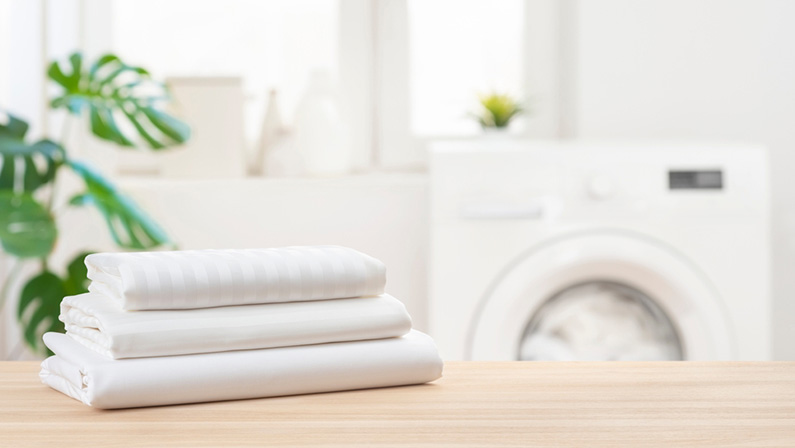
We all love sinking into a clean, fresh bed at the end of a long day, but how often should we wash our bedding to maintain that level of comfort and hygiene?
While it may seem like a simple task, knowing the right frequency for washing sheets, pillowcases, and blankets is essential for both cleanliness and health.
From the buildup of dust mites and allergens to sweat and oils from your skin, your bedding can accumulate a variety of unwanted particles over time.
In this article, we’ll break down how often you should wash your bedding, offer tips on keeping it fresh longer, and help you create a routine that works for your lifestyle.
Why Is It Important to Wash Your Bedding Regularly?
Regularly washing your bedding is crucial not only for maintaining a fresh, inviting sleep environment but also for promoting overall health and hygiene. Bedding can harbor dust mites, allergens, oils, sweat, and other contaminants that can negatively affect your skin and respiratory system.
- Prevents Allergies and Irritations: Dust mites, pet dander, and pollen can accumulate in your bedding, triggering allergic reactions or skin irritations. Washing your bedding helps eliminate these allergens, creating a healthier sleep environment.
- Removes Bacteria and Germs: Over time, sweat, body oils, and other bodily fluids can build up on your bedding, creating a breeding ground for bacteria. Regular washing helps reduce the risk of infection and promotes better hygiene.
- Improves Sleep Quality: Clean bedding not only feels better but can also lead to a more restful night’s sleep. Sleeping on fresh sheets can be more relaxing and comfortable, allowing you to rest more effectively.
How Often Should You Wash Different Types of Bedding?

When it comes to washing your bedding, not all items need the same level of care or frequency. Depending on usage, material, and exposure to allergens or stains, different bedding items have different washing needs.
Here’s a breakdown of how often you should wash each type:
Sheets and Pillowcases
Sheets and pillowcases are in direct contact with your skin and hair, making them the most prone to accumulating sweat, oils, and bacteria. It’s recommended to wash them once a week to maintain cleanliness and comfort. If you’re prone to allergies or skin conditions, washing them more frequently may be beneficial for avoiding irritations.
Pillows
Pillows can collect dust, sweat, and oils from your skin, as well as allergens like dust mites. While pillowcases should be washed regularly, the pillows themselves need to be cleaned about every 3-6 months. Some pillows can be machine washed, while others may need spot cleaning or professional care.
Comforters and Duvets
Comforters and duvets tend to be used less frequently than sheets, but they still require regular cleaning to maintain freshness and hygiene. It’s recommended to wash them every 2-3 months, depending on usage. If you have pets or allergies, more frequent washing may be necessary, and dry cleaning could be a safer option for certain materials.
Mattress Protectors
Mattress protectors shield your mattress from spills, stains, and allergens, but they still need to be washed to keep them effective. Ideally, wash mattress protectors every 1-2 months to ensure they remain clean and free from bacteria, dust mites, and other contaminants.
Blankets and Throws
Blankets and throws are often used for warmth and comfort but don’t require washing as frequently as sheets. It’s generally recommended to wash them every 1-2 months or whenever they get visibly soiled or have absorbed odors. However, if you use them regularly, washing them once a month helps keep them fresh and hygienic.
What Factors Influence How Often Bedding Should Be Washed?
Several factors can determine how often your bedding should be washed, including your lifestyle, health, and environmental conditions. By considering these factors, you can establish a more personalized washing schedule that ensures a cleaner, healthier sleep environment.
Allergies and Skin Sensitivity
If you suffer from allergies or have sensitive skin, it’s important to wash your bedding more frequently to reduce the buildup of allergens and irritants. Dust mites, pet dander, and pollen can accumulate in your sheets and pillowcases, exacerbating allergic reactions or skin conditions like eczema or acne. Washing your bedding every 3-4 days can help reduce exposure and improve your quality of sleep.
Pets in Bed
Pets, especially dogs and cats, can contribute to dirt, fur, and bacteria accumulating on your bedding. If your pets regularly sleep in bed with you, it’s essential to wash your sheets and pillowcases more often—at least once a week—to remove pet hair, dander, and any potential germs they carry. Regular washing helps minimize the risk of allergies and keeps your bed clean and fresh.
Sweating and Illness
Sweating during the night, whether from warm temperatures or illness, can cause a buildup of body oils and bacteria on your bedding. If you’re sick or sweat heavily while you sleep, it’s a good idea to wash your bedding more often to prevent unpleasant odors and the growth of germs. Consider washing your sheets after a period of illness or during hotter months when sweating is more common.
Climate and Season
The climate in your region and the changing seasons can also impact how often your bedding should be washed. In warmer, more humid climates, bedding can accumulate sweat and moisture faster, requiring more frequent washing—typically once a week. During colder months, when you’re using blankets or duvets more often, you may be able to stretch washing them to once every couple of weeks.
How Can You Tell If Your Bedding Needs Washing Sooner?

Sometimes, even if it’s not yet time for your usual bedding wash, you may notice signs that indicate your sheets or pillowcases need cleaning sooner than expected. Being mindful of these signs can help maintain a more hygienic and comfortable sleep environment.
- Unpleasant Odors: If your bedding starts to develop an unpleasant smell, such as body odor or stale scents, it’s a clear sign it’s time to wash. Odors can be caused by sweat, oils, or bacteria that have built up over time.
- Visible Stains or Dirt: Spotting stains or dirt on your sheets or pillowcases means they need to be cleaned as soon as possible. Food crumbs, makeup stains, or spilled drinks can accumulate quickly, making washing necessary to avoid permanent stains.
- Allergy Flare-Ups or Skin Irritations: If you notice an increase in allergy symptoms like sneezing, runny nose, or skin irritations, it could be due to the buildup of dust mites, pet dander, or other allergens in your bedding. Regular washing will help alleviate these symptoms and ensure a cleaner, healthier sleep environment.
What Is the Best Way to Wash and Care for Bedding?
The best way to wash and care for your bedding depends on the fabric and material of each item. Different types of bedding require different washing methods to preserve their integrity and ensure longevity.
Here’s how to properly care for some common bedding materials:
Cotton
Cotton is one of the most common bedding materials due to its durability and comfort. To keep cotton sheets soft and fresh, machine wash them in warm water with a mild detergent and tumble dry on low heat. Avoid using bleach, as it can weaken the fibers and cause color fading.
Silk
Silk bedding requires a gentler touch because it’s delicate and prone to damage. Hand wash or machine wash on a gentle cycle with cold water and a silk-friendly detergent. It’s best to air-dry silk sheets and comforters to prevent any damage caused by high heat in the dryer.
Down and Feather Comforters
Down and feather comforters require extra care due to their fluffy and insulating nature. Wash them in cold water on a gentle cycle, and use a mild detergent to preserve the natural loft of the filling. Dry them on low heat with a couple of clean tennis balls or dryer balls to help fluff them back up.
Are There Ways to Keep Bedding Fresh Between Washes?
While regular washing is important, there are a few ways to keep your bedding fresh between washes. These methods can help extend the freshness of your sheets and keep your sleep environment clean.
- Use a Mattress Protector: A mattress protector can help keep your mattress clean by preventing dust mites, spills, and sweat from seeping into your bedding. Washing the protector regularly can reduce the need for frequent full washes of sheets.
- Air Out Bedding Regularly: Letting your bedding air out by pulling back the sheets and comforter in the morning can help keep them fresh. Exposure to fresh air helps eliminate moisture, reducing the growth of bacteria and musty odors.
- Sprinkle Baking Soda: Sprinkle a light layer of baking soda over your sheets and comforter before making your bed. Baking soda helps absorb odors and moisture, leaving your bedding smelling fresher between washes.
What Happens If You Don’t Wash Your Sheets Regularly?
Neglecting to wash your sheets regularly can lead to a buildup of dirt, oils, and bacteria, which can negatively affect both your hygiene and your overall health. Not maintaining a consistent cleaning schedule can also result in unpleasant odors and skin irritation.
- Bacterial Growth: Dirty sheets can become a breeding ground for bacteria and fungi, which can lead to infections and skin conditions. These germs can transfer from your bedding to your skin while you sleep.
- Increased Allergens: Dust mites, pollen, pet dander, and other allergens accumulate in bedding, especially if they are not washed frequently. This can exacerbate allergy symptoms and affect your breathing and overall well-being.
- Unpleasant Odors: If you don’t wash your sheets regularly, the buildup of sweat and oils can cause an unpleasant odor to develop. This can make your sleeping environment uncomfortable and affect the quality of your rest.
How Can Clean Bedding Improve Your Sleep Quality?
Clean bedding not only contributes to a more aesthetically pleasing sleep environment, but it can also enhance your overall quality of sleep.
Fresh, soft sheets and pillowcases create a comfortable, inviting atmosphere that makes it easier to fall asleep and stay asleep throughout the night.
Additionally, regular washing reduces allergens, bacteria, and other irritants that can affect your health, ensuring you have a restful, undisturbed sleep cycle. A clean bed can also promote relaxation, help reduce stress, and provide a sense of comfort, making it an essential part of a healthy sleep routine.
Keep Your Bedding Fresh and Clean for Better Sleep
Maintaining clean bedding is essential not only for your hygiene but also for your overall well-being and sleep quality. Regular washing ensures a healthier, more comfortable sleeping environment by reducing allergens, bacteria, and unpleasant odors.
If you’re looking for convenience and efficiency in your laundry routine, SpinXpress offers a 24/7 laundromat in Corpus Christi, TX, providing top-notch laundry services whenever you need them. Whether you need a quick wash or deep cleaning, SpinXpress is here to help make your laundry experience effortless and stress-free. Visit us today and enjoy fresh, clean bedding in no time!





